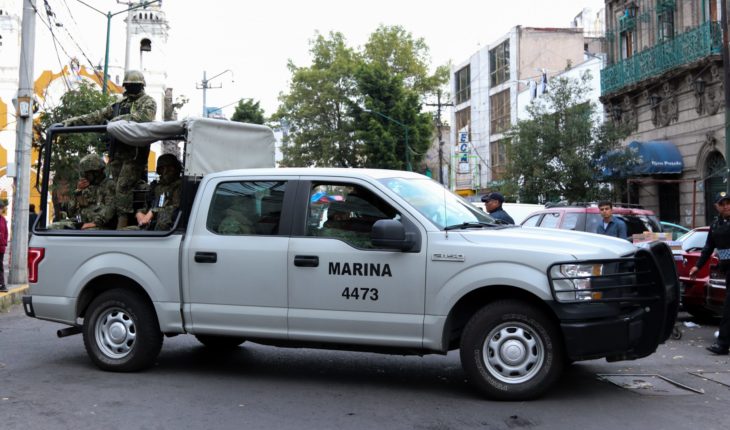The Chamber of Deputies is looking at a reform initiative that seeks move port supervision, port management and control and maritime trade and maritime trade from civilian to military in our country. This is in charge of the Mexican Navy Secretariat (Semar).
This proposal, promoted by members of The Morena parliamentary group, under the advice of Semar herself, has generated various comments and opinions in the public sphere, including criticisms – including from the Secretariat of Communications and Transport (SCT) itself – who denounce the intention to “militarize” a civilian activity.
Under pressure, Deputy Mario Delgado, coordinator of the Morena bench in San Lázaro, announced at night that the vote on the initiative originally scheduled for Tuesday in committees was postponed, in order to continue the analysis.
Reads: Semar investigates video where two alleged sailors mock feminist performance
But what exactly is it that you intend to modify? what are the needs or advantages with which we try to justify this change according to the project? What risks do specialists and opponents see? How can changes affect people’s daily lives?
Political Animal presents below a guide with the key points around this reform.
What is traded by the sea?
According to a study prepared by Congress itself almost everything: 80 per cent of world trade is done by sea. Cars, electronics, clothing, footwear, materials and substances of all kinds, non-perishable foods, precursors for medicine… are just a few examples of what comes to the ports.
Mexico is one of the main epicenters of maritime trade in Latin America as it has 38 ports in the Pacific and Atlantic oceans. Some of these ports, in addition to being used for commercial and logistical purposes, are also important focuses for tourism.
What does the reform seek to change?
The initiative proposes changes to various articles of two laws: the Organic Law of the Federal Public Administration and the Law on Navigation and Maritime Trades.
The objective of these is to transfer the responsibility of organizing, regulating and monitoring maritime trade in the country of the Secretariat of Communications and Transport (SCT), which is currently responsible, to the Mexican Marine Secretariat (Semar).
The Semar already participates in maritime trade issues, but only in terms of rescue and supervision functions, powers that were granted to it after a reform passed in 2016.
Does this militarize maritime trade?
If the reform is to succeed, yes, the SCT is excluded from its powers on maritime trade today, thus eliminating the participation of civil authorities in this field. All responsibility would concentrate on a single “National Maritime Authority” under the jurisdiction of the Semar.
Read: Military and Marines Can Use Force, But with Respect for Human Rights, says AMLO
Examples of the functions that would be removed from the SCT to be transferred to the Semar are: supervision of the merchant navy, the issuance of permits and corresponding licenses, the management of the National Maritime Public Registry, the certification of vessels, the regulation of communications and transport by water, the appointment or removal of port captains, among others.
With the reform the Navy would also assume several exclusive faculties such as the so-called “dredging” that serves to facilitate the passage and berthing of vessels in port areas, activities that by their nature can generate environmental impacts.
According to the project What are the benefits of these changes?
Morena’s initiative describes several advantages. It emphasizes, for example, that the “duplication of functions and resource disposal” that is currently presented would be eliminated, after These was involved in some port oversight functions in 2016, but in turn, civilian jurisdiction was maintained in the ports.
The initiative adds that the creation of a unified Maritime Authority will provide greater guarantees of security and port protection, which will encourage international trade. The environment will also be more effectively protected with a strengthened authority.
In turn, “legal loopholes” that led to the reforms in recent years will be eliminated, and where two authorities (SCT and Semar) were intervened, often do not agree to address a specific issue, creating uncertainty.
In short, it is emphasized that this reform is in line with the policy of honesty, austerity and efficiency in the exercise of public resources promoted by the current government.
What are the risks, according to critics and experts?
According to a study given to opposition lawmakers in Congress, these modifications can have negative effects of various kinds.
One of the clearest and that can affect trade and therefore consumers are delays in the procedures for arrival, disclaimer and distribution of goods. This as a result of the military structure itself which is square and subordinate, which would therefore cause each action to require the authorization of a higher command.
“This feature clashes with the operation of the national maritime/port system, which requires immediate decision-making to solve possible problems that usually arise, or for various actions powers,” the study says.
Federal Deputy Martha Tagle of the Movimiento Ciudadano party told this medium that change can also generate bewilderment in businessmen in the sector by changing operating rules again. Added to this is the risk of greater opacity in the use of public resources in port infrastructure due to the reserve with which the armed forces operate.
Experts and legislators agree on the risk of generating “slow and obsolete” maritime trade by assigning its management to a military authority (Semar) whose natural function is not to regulate any trade activity, and therefore lacks experience in the field.
It is further noted that this change goes against a global inertia aimed at moving the merchant fag into the civilian sphere. Of the 174 countries that make up the International Maritime Organization, only 11 have Maritime authorities with Castrense command, including Chile, Peru, the Dominican Republic and North Korea, which have in common a past or present with military dictatorship.
Tagle added finally that there could also be environmental impacts as there are port and maritime activities that by their nature must be measured and audited, and the Navy lacks experience in law.
For its part, the collective “Security Without War” issued a statement in which it failed this initiative because it considered that it sought to militarize another task that should be civilian, and that it adds to previous actions in the same direction as the formation of the National Guard under the leadership of the armed forces.
Opposition within the government itself
The Ministry of Communications and Transport (which would lose control of the country’s ports to succeed in succeeding these amendments) has expressed its total disagreement on this reform of the merchant navy.
The draft opinion includes the negative view of the SCT: “This Secretariat was not consulted on this matter and we obviously do not agree in any way on what is being proposed to bring imminently civilian activity to militarization”.
In an interview with the newspaper Milenio Héctor López Gutiérrez, General Coordinator of Ports and Merchant Marine of the SCT, went further and assured that it is an initiative “unconstitutional, and typical of dictatorial governments”.
When would it be approved and what alternative do your opponents promote?
The intention of the Morena parliamentary group was for this legal reform to be discussed and approved today in the Committee on the Governance and Population, so that on Wednesday it would be addressed before the plenary. This with the intention that it would be approved this week.
However, Mr Mario Delgado made it known last night that the committee analysis would be postponed in order to continue reviewing the opinion.
It should be noted that since it is not a reform that amends the Constitution, the Morena bench is sufficient to get a simple majority in the plenary (which it manages with its legislators and allies) for the initiative to be approved and sent for its respective revision to the Senate. However, some legislators in the majority group have expressed concern about the SCT’s open non-conformity.
In the meantime, what Members are proposing, opposing the opinion and a number of civil organisations, is that the scope and possible consequences of such a reform should first be analysed in depth, before it is adopted. To this end, the figure of “open parliament” has been raised, which consists of holding forums with specialists who make contributions and that are taken into account by legislators.
What we do in Animal Político requires professional journalists, teamwork, dialogue with readers and something very important: independence. You can help us keep going. Be part of the team.
Subscribe to Animal Politician, receive benefits and support free journalism.#YoSoyAnimal
translated from Spanish: What happens if the Navy takes over trade at sea?
December 10, 2019 |





